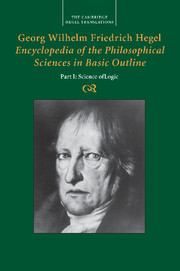 Georg Wilhelm Friedrich Hegel: Encyclopedia of the Philosophical Sciences in Basic Outline
Georg Wilhelm Friedrich Hegel: Encyclopedia of the Philosophical Sciences in Basic Outline Published online by Cambridge University Press: 30 September 2021
§84
Being is the concept only as it is in itself. Its determinations have being, i.e. in their difference they are others opposite one another, and their further determination (the form of the dialectical) is a process of passing over into an other. This progressive determination is at once a matter of setting forth and thereby unfolding the concept, as it is in itself, and at the same time the process of being entering into itself, a deepening of it within itself. The explication of the concept in the sphere of being becomes the totality of being, precisely to the extent that the immediacy of being or the form of being as such is sublated in the process.
§85
Being itself as well as the subsequent determinations, not only those of being but also the logical determinations in general, can be regarded as the definitions of the absolute, as metaphysical definitions of God. More specifically, only the first simple determination within a given sphere, and then the third, which is the return froma difference to the simple relation to itself, can always be regarded in this way. For, to define God metaphysically means to express his nature in thoughts as such. But logic comprises all thoughts as they are while still in the form of thoughts. By contrast, the second determinations, making up a given sphere in its difference [Differenz], are the definitions of the finite. But if the form of definitions were used, this would entail envisaging a representational substratum. For even the absolute, what is supposed to express God in the sense and in the form of thought, remains merely an intended thought, i.e. a substratum that as such is indeterminate, relative to its predicate as the determinate and actual expression in thought. Because the thought, the basic matter solely at issue here, is contained only in the predicate, the form of a proposition, like that subject, is something completely superfluous (cf. § 31 and the chapter on the judgment below [§§ 166 et seq.]).
Addition. Each sphere of the logical idea proves to be a totality of determinations and a presentation of the absolute, and so too does being, which includes within itself the three stages of quality, quantity, and measure.
To save this book to your Kindle, first ensure [email protected] is added to your Approved Personal Document E-mail List under your Personal Document Settings on the Manage Your Content and Devices page of your Amazon account. Then enter the ‘name’ part of your Kindle email address below. Find out more about saving to your Kindle.
Note you can select to save to either the @free.kindle.com or @kindle.com variations. ‘@free.kindle.com’ emails are free but can only be saved to your device when it is connected to wi-fi. ‘@kindle.com’ emails can be delivered even when you are not connected to wi-fi, but note that service fees apply.
Find out more about the Kindle Personal Document Service.
To save content items to your account, please confirm that you agree to abide by our usage policies. If this is the first time you use this feature, you will be asked to authorise Cambridge Core to connect with your account. Find out more about saving content to Dropbox.
To save content items to your account, please confirm that you agree to abide by our usage policies. If this is the first time you use this feature, you will be asked to authorise Cambridge Core to connect with your account. Find out more about saving content to Google Drive.